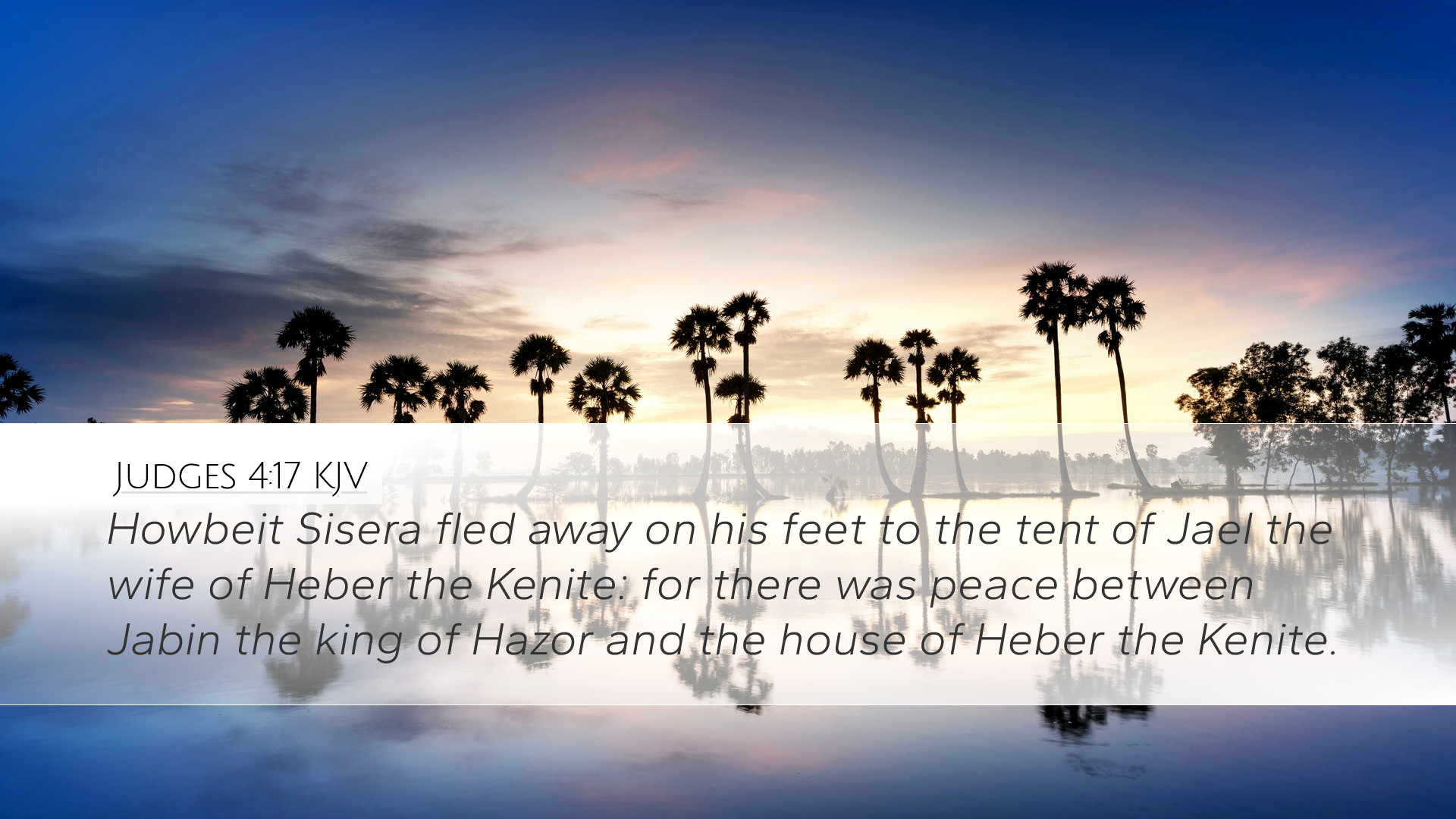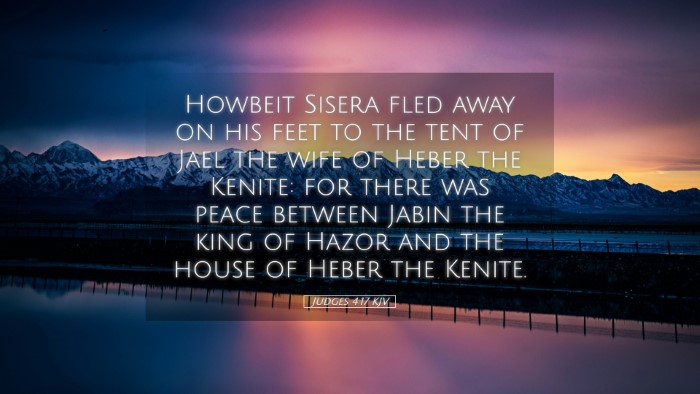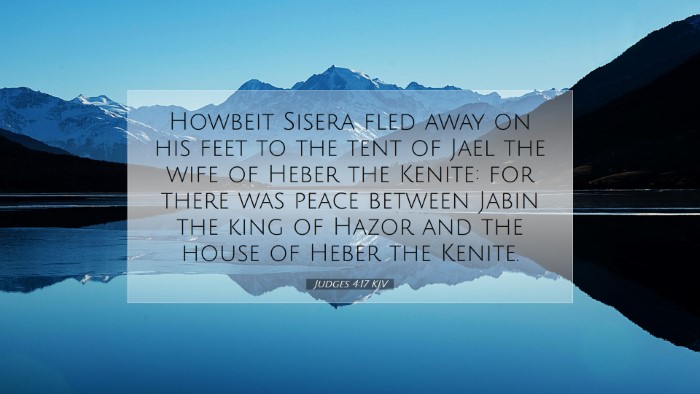Old Testament
Genesis Exodus Leviticus Numbers Deuteronomy Joshua Judges Ruth 1 Samuel 2 Samuel 1 Kings 2 Kings 1 Chronicles 2 Chronicles Ezra Nehemiah Esther Job Psalms Proverbs Ecclesiastes Song of Solomon Isaiah Jeremiah Lamentations Ezekiel Daniel Hosea Joel Amos Obadiah Jonah Micah Nahum Habakkuk Zephaniah Haggai Zechariah MalachiJudges 4:17
Judges 4:17 KJV
Howbeit Sisera fled away on his feet to the tent of Jael the wife of Heber the Kenite: for there was peace between Jabin the king of Hazor and the house of Heber the Kenite.
Judges 4:17 Bible Commentary
Commentary on Judges 4:17
Judges 4:17 states: “However, Sisera fled away on foot to the tent of Jael, the wife of Heber the Kenite; for there was peace between Jabin the king of Hazor and the house of Heber the Kenite.” This passage is pivotal in the narrative of Deborah and Barak, as it indicates the momentous shift in the battle between Israel and the Canaanites.
Contextual Background
The narrative in Judges 4 leads us into a critical confrontation between the forces of Israel and their Canaanite oppressors. The Canaanite leader, Sisera, commands a formidable army, yet this verse highlights a dramatic turn of events as he seeks refuge from defeat.
Analysis of Key Themes
- Divine Providence: The escape of Sisera to Jael’s tent can be viewed as a demonstration of God’s providential control over the events of Israel's deliverance. Matthew Henry remarks that the hand of God can use unexpected means to fulfill His purpose, which is echoed by Albert Barnes, who stresses that God orchestrates outcomes beyond human comprehension.
- Interpersonal Relations: The relationship between Jabin of Hazor and Heber the Kenite illustrates the complex allegiances and treaties of the time. Adam Clarke notes that this peace allowed Sisera to mistakenly believe he would find safety among those he thought were neutral or friendly, highlighting the deceptive nature of his situation.
- Courage and Femininity: Jael's role in the narrative is crucial. She embodies the theme of courage in the face of male dominance and oppression. This verse sets the stage for Jael’s decisive act, which contributes to the ultimate downfall of Sisera, symbolizing the empowerment of women in God's plans.
Critical Reflections
This passage not only serves as a chronicle of historical events but also prompts critical reflections on several levels:
- Political Manipulation: Sisera's flight to Jael indicates the often murky waters of political alliances and the perils of misplaced trust. He sought refuge in a family that was ostensibly aligned with his overlord, demonstrating how political affiliations can shift and deceive, a theme still relevant today.
- God’s Sovereignty: The incident serves as an illustration of God’s sovereignty over the affairs of men. As Sisera attempts to evade justice, it is revealed that no man can escape the ordained events set in motion by God—a significant lesson for those in leadership about the righteousness of their actions.
Theological Insights
The theological implications of Judges 4:17 extend beyond its historical context:
- God Uses the Weak: The use of Jael, a woman, to fulfill God's judgment against Sisera reminds leaders and believers that God often uses the weak or marginalized to accomplish His purposes. Henry emphasizes the notion that God does not always use the strong and mighty, which should encourage believers to rely on God's power regardless of their position.
- Judgment and Mercy: This passage also reflects God's justice as Sisera, an oppressor, is doomed to meet his fate. The mercy of God is evident in His provision of a savior and a deliverance plan for His people. This dual theme of mercy and judgment is central to understanding the character of God as revealed throughout the Scripture.
Practical Applications
For pastors, students, and scholars, Judges 4:17 challenges us to consider:
- Vigilance in Leadership: Leaders must discern the true nature of alliances and the significance of their choices, as Sisera’s downfall illustrates that trusting in seemingly benign relationships can have dire consequences.
- Courageous Action: Like Jael, we are called to act with courage in our contexts, taking stand against oppression and injustice as instruments of divine purpose.
- Faith in God’s Plan: The events surrounding Sisera’s flight serve as a reminder that faith must persist even when immediate outcomes seem uncertain. God’s plan often unfolds at His timing, as demonstrated through ensuing events in this narrative.
Conclusion
Judges 4:17 is an essential verse that encapsulates God’s governing hand in both historical and personal realms. It illustrates the unexpected turns in narratives influenced by divine providence and human agency. As believers and scholars reflect on these themes, they are enriched in their understanding of God’s role in history and in their personal lives, encouraging them to engage faithfully and courageously in their own contexts.


